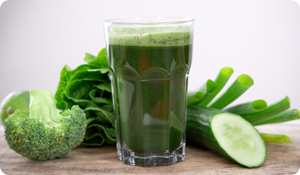
Juicing is hot. From all-American orange juice that's still a staple at the morning table to the multitude of smoothies now found everywhere from supermarkets to specialty juice bars, juice has never been more popular. Is there any downside to the trend?
Yes, says Stephanie Middleberg, MS, RD, CDN, a New York City dietitian and the founder of Middleberg Nutrition. "The problem is that juices have a bit of a health halo now, and many can be filled with sugar and produced from concentrate, not whole foods," she explains. So how do you know what to drink? We asked Middleberg and other experts for what to pick, and what to pass:
Pick...
Green, vegetable-based juices.
"Spinach and kale are rich in vitamins, minerals, and phytonutrients," says Alison Massey, MS, RD, LDN, a dietitian and diabetes educator at Mercy Medical Center in Baltimore. "They are also a great way to add some additional fiber into your juice." Although you can make a straight veggie juice from greens, most people find these savory super foods more palatable when mixed with sweeter fruit juices.
Blueberry juice.
Dietitians agree that blueberries are a standout among fruits because of their plentiful vitamins, minerals, and antioxidants. There also has been research potentially linking blueberries to better cognitive health.
Citrus fruits.
"Lemons, limes, oranges, and grapefruit are great additions to immune smoothies because they are high in vitamin C—a vitamin known to help boost immunity," Middleberg says.
Pass...
Fruit cocktails and juice blends.
These concoctions often contain a small amount of real fruit juice and a lot of sugar water, so read labels carefully.
Multiple servings.
Just as important as choosing healthful juices as part of your diet is not overdoing it, as juice tends to be high in calories. Middleberg suggests limiting yourself to one glass of juice per day while continuing to drink six to eight glasses of water for optimal hydration. And read to label to find out what constitutes a serving size.
Sugary sips.
Not only does juice tends to be high in calories, it can be high in sugar—some natural, some added. Consider avoiding any juice that contains more than 25 grams of sugar and/or 30 grams of carbohydrates per serving.





